Inspiring Protection
A love of our Great Lakes and its freshwater ecosystems demands participation in the work to protect them.
❖
By Daniel Sloboda
7 min read
RECREATION
Act Now
↓When you love a place, you do whatever you can to protect it.
Through its rivers, astonishing sights, and the lakes themselves, the Great Lakes Basin provides an endless array of recreational opportunities that allow the 35 million people who live in the basin to develop this love. How do we as a region best support our relationships to the lakes that sustain us? Moreover, how do we translate these connections into a rally for the Great Lakes’ preservation and restoration? The future of our freshwater depends on expanding our preconceived notion of outdoor recreation, making the outdoors accessible for all communities, and implementing innovative collaborations to connect recreation, education, and action.
Converting recreation to protection
While some 35 million US and Canadian citizens rely on the Great Lakes to sustain us physically, all too often it’s overlooked that we rely on them emotionally as well. The outdoors sustain our appetite for adventure, community, healing, religion, and a plethora of other intrinsic needs. It is through recreation - defined simply as any activity that brings us enjoyment as an individual – that we’re able to achieve these needs.
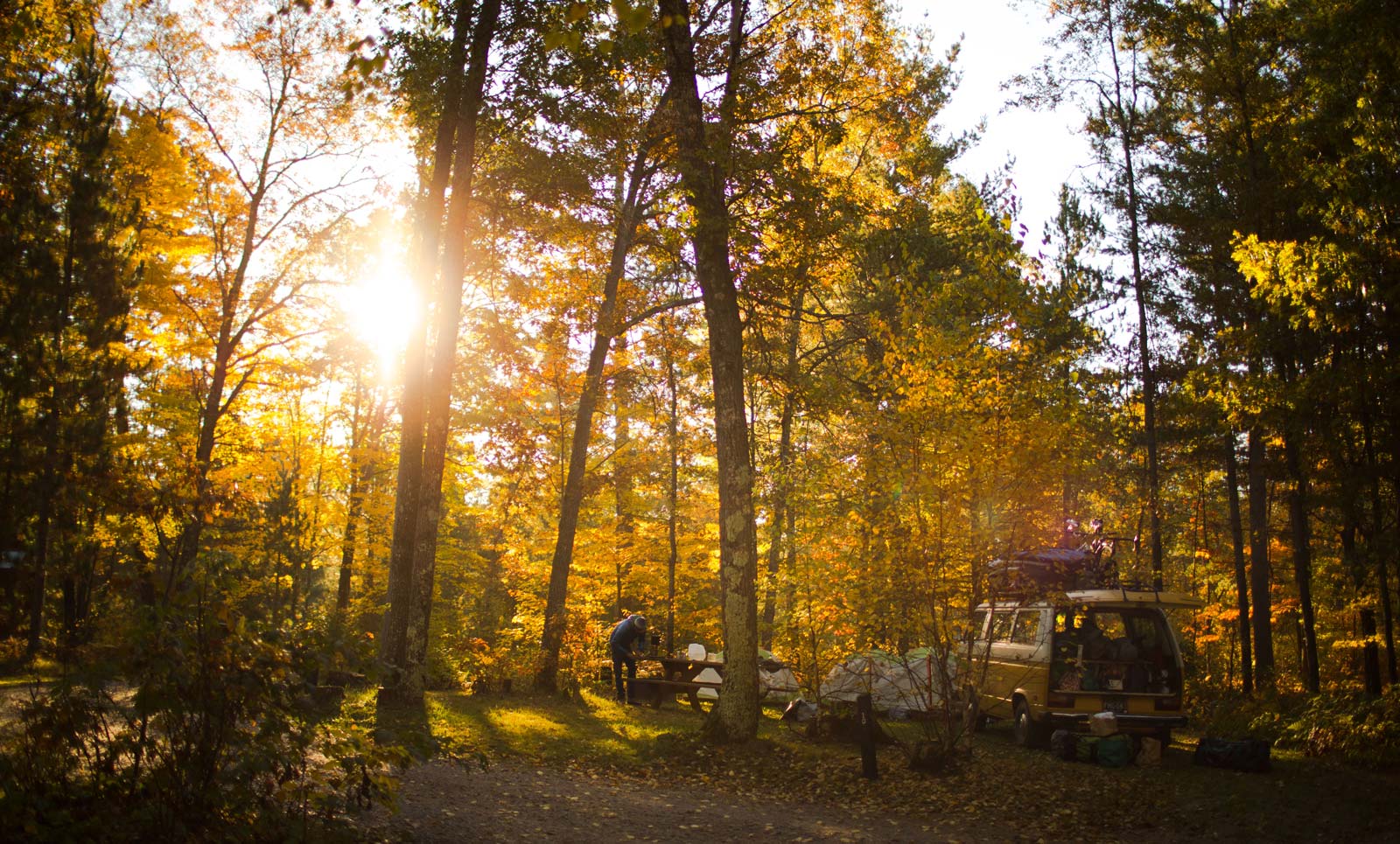
Millions of people enjoy camping in the Great Lakes region every year.
The question presents itself then, does our recreation and ability to connect with nature rely on the water being healthy?
The answer, undeniably, is yes. Just as with drinking water and the 3,500 plus species that rely on the Great Lakes for survival themselves, healthy and clean freshwater ecosystems nourish us, invite us in as a community, and inspire us to maintain their balance. The relationship between us and the Great Lakes Basin is symbiotic, demanding that we act in responsible stewardship to preserve it for ourselves and all generations to come.
Caroline Kason shares her love of water.
In an area defined by freshwater, no matter how we choose to enjoy the lakes, wetlands, and rivers that feed them, the endless opportunities provided by the Great Lakes ensure that everyone can find their connection to freshwater. Through this connection, everyone can find a reason to help protect, preserve, and restore their waters.
Broadening our conception of recreation
When we discuss “outdoor recreation,” our notion of those activities draw images of boating, biking, camping, and fishing. While not wrong, these answers uncover a critical discussion taking place throughout our country: How do we define recreation?
While this question may seem pedantic, its implications for the future of freshwater are massive. All too often our idea of outdoor recreational involves activities that are time, energy, travel, or economically intensive. The problem with this notion? By narrowly defining recreation and focusing on expensive activities, we exclude those who may not have these resources from the outdoors, thereby starting a compounding chain of events that exclude them even further. How can all communities be involved in the future of our freshwater and recreational developments when their connections aren't recognized as recreation?
Spending time around our freshwater ecosystems connects us with the natural environment. It makes us aware of its health, invested in its future, and inspired to become a voice for its protection and responsible development. When a group of people is excluded from enjoying our freshwater, they’re excluded from the conversation. They’re excluded from the voice that collectively defends this resource.
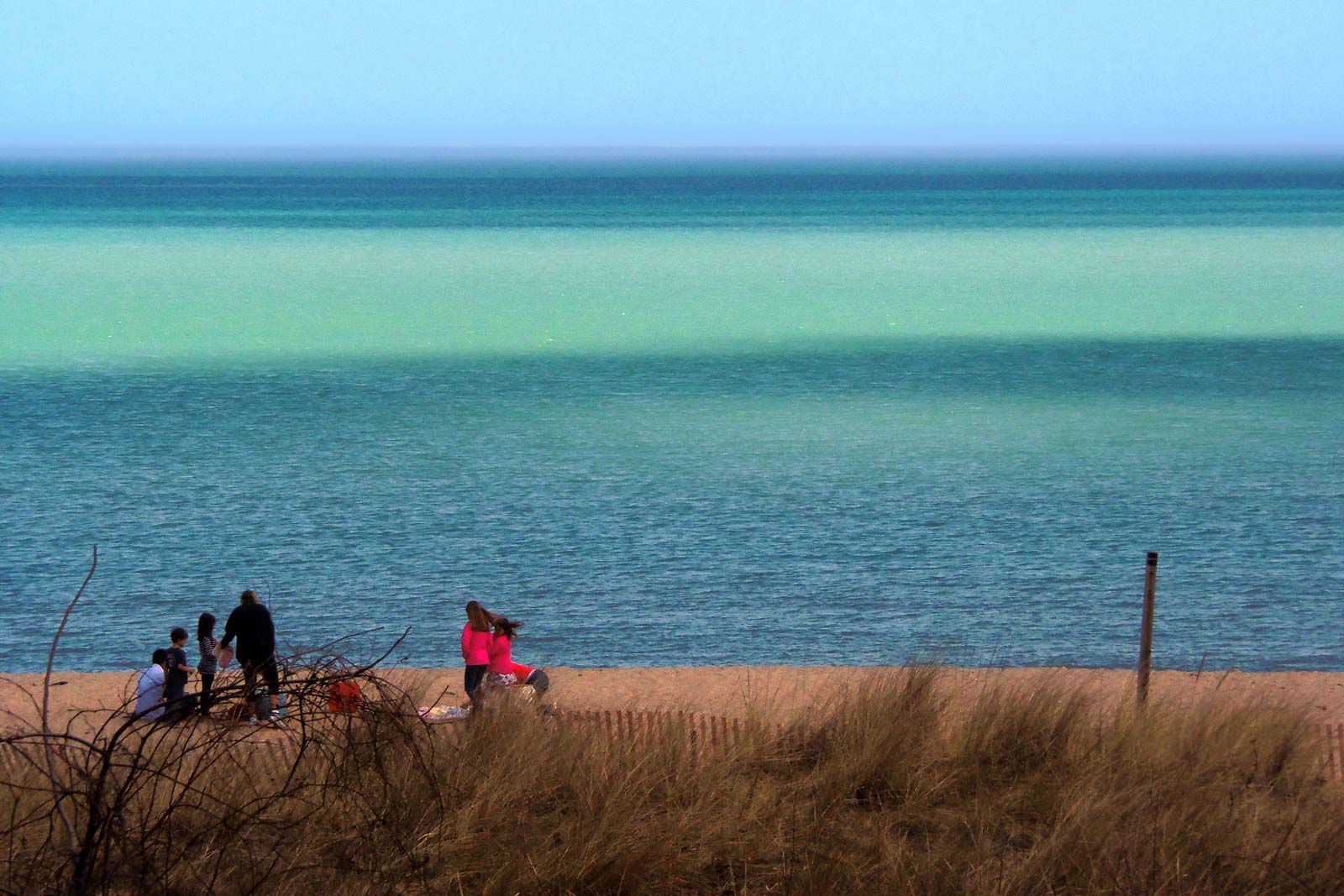
So what is recreation? Recreation is, at its foundation, about enjoyment. It’s how we connect as individuals and as communities. To some it may be surfing on Lake Superior in sub-freezing temperatures, to others, having a family picnic on the riverfront. Regardless of your resources or background, we all deserve the opportunity to connect with the incredible resource that defines our lives. As a public commons, the Great Lakes rely on us as a collective to protect it. By broadening our conversation of recreation to include accessible activities, we increase our voice for protection. More importantly though, we ensure all people no matter their individual resources, receive the support and resources they need to connect to the Great Lakes as a community.
Inclusion in practice
What does equal access to our freshwater look like from the perspective of recreation? Well, it starts with an understanding of the challenges. Just as communities experiencing water system failures are too often excluded from decisions that can determine their fate, the same communities are excluded from connecting with the outdoors and experiencing the same enjoyment afforded to others. This lack of access to and/or opportunities for recreation is one and the same - an environmental justice issue. It will take far more than just changing our concept of recreation to fix it.
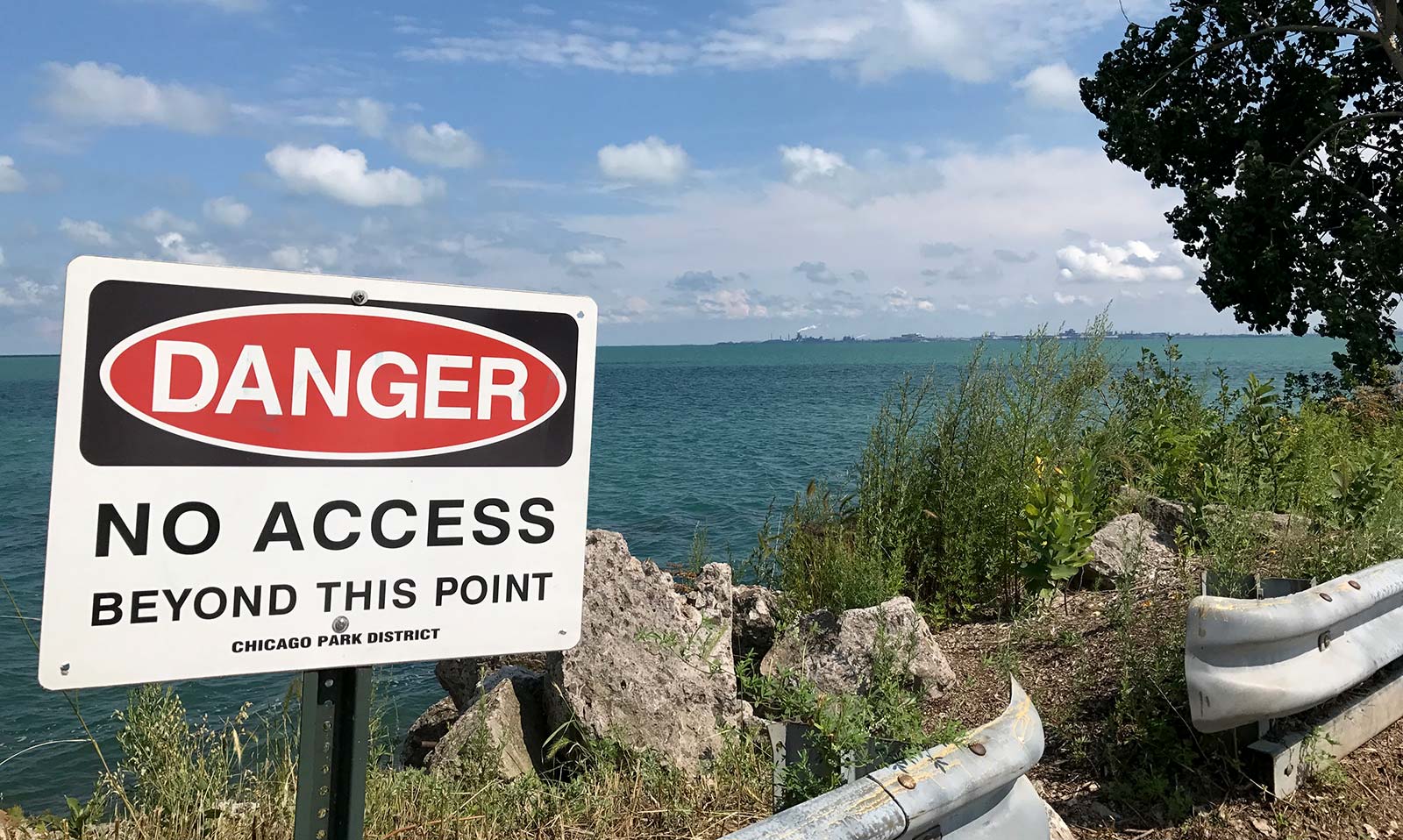
Communities of color and low income communities across the nation suffer from disparities in access to resources for parks and healthy living. This is part of the continuing legacy of neglect, segregation, and structural inequality in wealth and income. In the Rust Belt, a region still haunted by industrial legacies, this fact is more apparent than ever. From rivers still polluted from the actions of past generations to soil laden with the lead of past factories, there’s no shortage of issues keeping communities at a distance from freshwater and public spaces. And while getting to the Lakes and other beautiful regions of the basin may be easy for some, the same may be impossible for those without personal transportation and the funds to get them there – making it even more important to ensure healthy local environments for all individuals to connect with.
As issues of equality in allocating natural resources are moving to the forefront, more attention is now being focused on how to best connect all citizens with our freshwater.
Coming together
With these challenges and the threats facing the Great Lakes in mind, the future of our freshwater relies on cities, individuals, communities, nonprofits, and businesses implementing innovative collaborations to connect recreation, education, and action. As we all rely on the Great Lakes to sustain us, we all play a role in their protection.
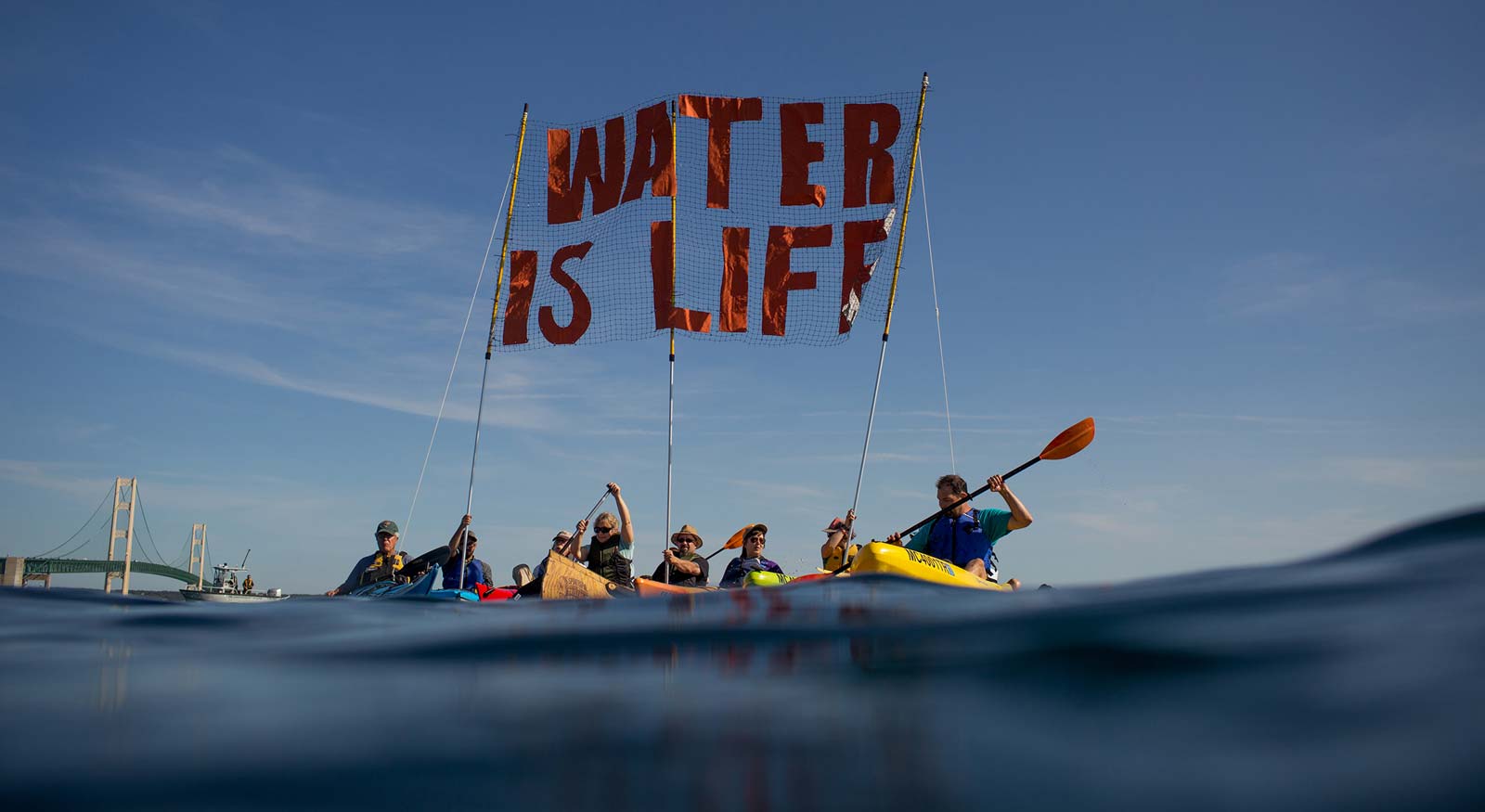
Recreation and action go hand-in-hand. Here kayakers protest Enbridge's Line 5 oil pipeline.
Luckily for us, this movement has already begun. Across the Great Lakes Basin, organizations are better understanding the importance that recreation plays in protection, implementing unifying and forward-looking visions for our freshwater that involve a range of stakeholders.
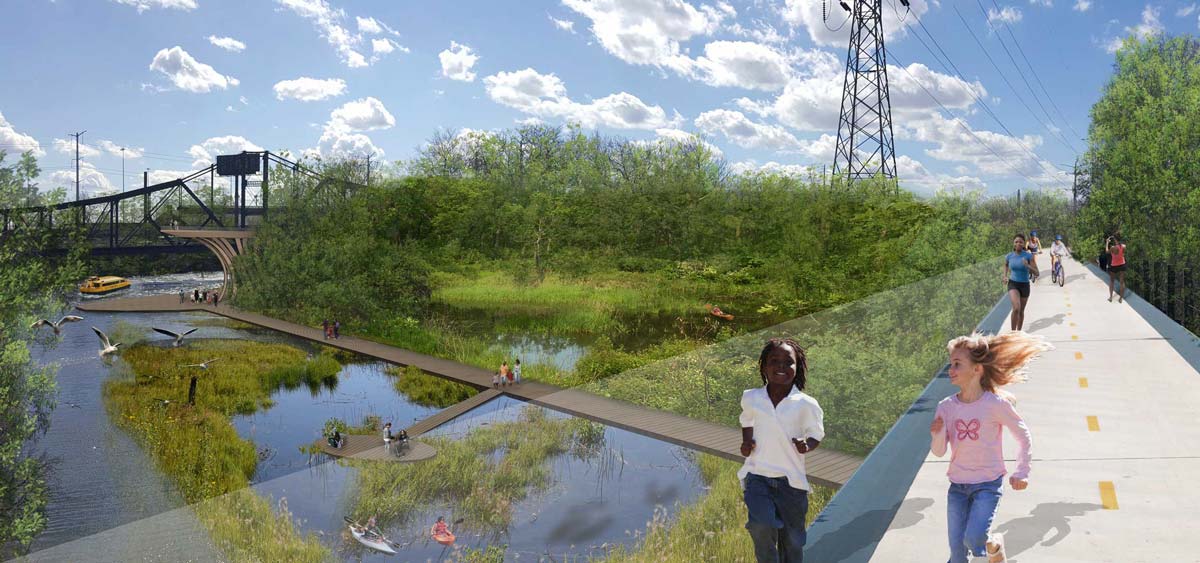
The ideas explored by the Great Rivers Chicago plan include reimagining large stretches of Chicago's waterfront as public recreational spaces. Image: Ross Barney Architects
On the southern shores of Lake Michigan for example, the Great Rivers Chicago plan lays the groundwork for the city’s three rivers to become inviting, productive and living places - where everyone can have their own experience. This plan was articulated by thousands of stakeholders through an intensive 18-month, citywide visioning process involving nonprofits, government, citizens, and urban planners.
As you look through the region, these plans are spreading. Cities are not only realizing the benefits that freshwater provides to their citizens, but also to the region as whole - collaborating to share best practices of engineering, restoration, community engagement, and sustainable recreation.
What can we do?
Protecting our shared ecosystems begins with forging a common bond. Becoming intimately familiar with a natural place – both its comforts and its challenges– can transform anyone into a conservationist.
→ Connect with Local Groups
If you’re worried about the health of a local area, notice it’s lacking the care and attention it needs, or simply want to share your love of a place with others, chances are there’s a group already organized around the place or issue. Nonprofit organizations are an incredible means of connecting with a place you love and ensuring its protection for the future. Attend a meeting, volunteer, help fundraise, donate, inform your friends and family about their work. Do whatever you can to support the groups that work tirelessly to ensure you have healthy environments to recreate in and enjoy.
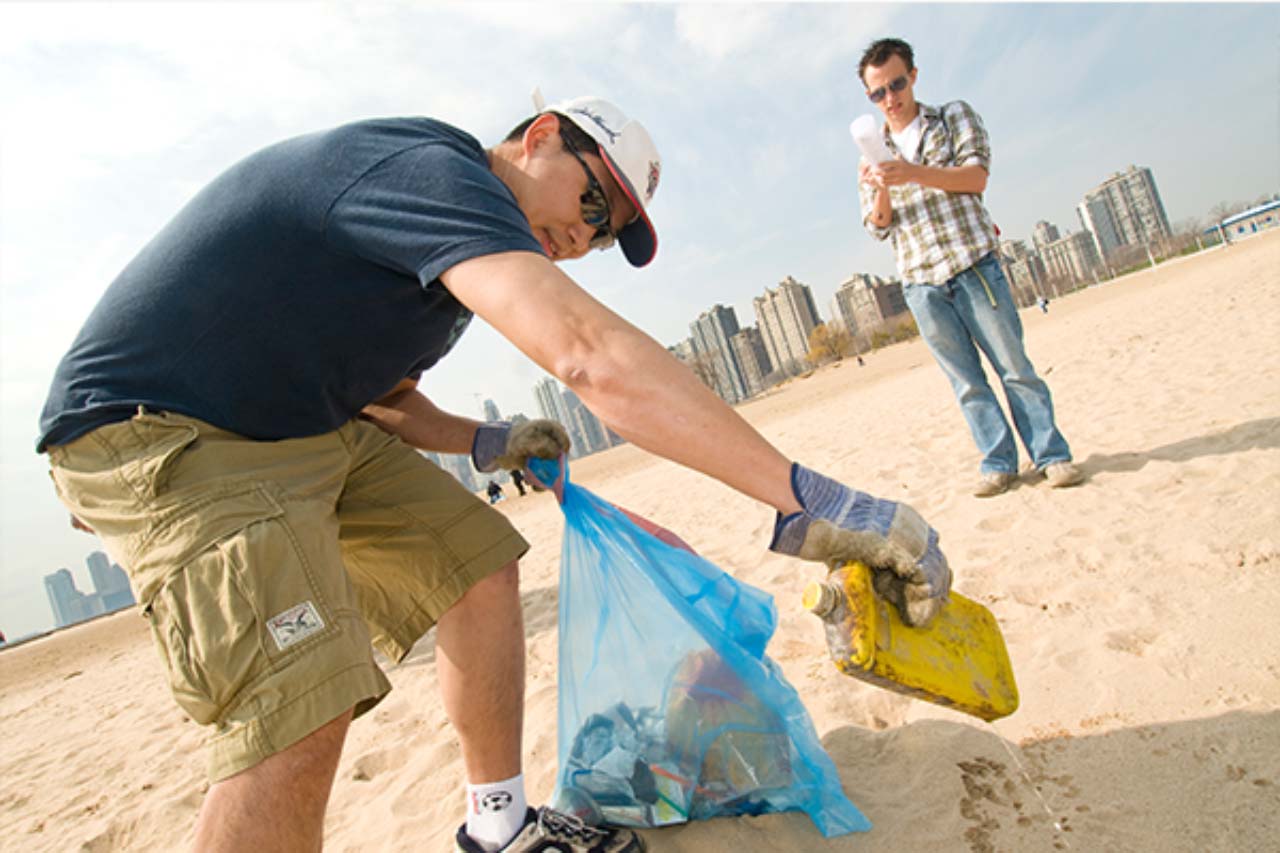
A great way to get involved is by participating in one of the Alliance for the Great Lake’s Adopt-A-Beach Program. For more than 25 years the Adopt-a-Beach program has worked to keep Great Lakes shorelines healthy, safe, and beautiful. Adopt-a-Beach touches all five Great Lakes with volunteers from all eight Great Lakes states. Find a cleanup near you!
Looking for an organization in your area? Start by exploring the Healing Our Waters Coalition Members. The Healing Our Waters-Great Lakes Coalition consists of more than 145 environmental, conservation, and outdoor recreation organizations; zoos, aquariums, and museums. Their member organizations represent millions of people who share a common goal: restoring and protecting North America’s greatest freshwater resources, the Great Lakes. On their members page you can find a list of organizations by region and state.
→ Support Great Lakes Restoration Funding
The Great Lakes Restoration Initiative was launched in 2010 to accelerate efforts to protect and restore the largest system of fresh surface water in the world — the Great Lakes. By restoring areas of concern afflicted by pollution, invasive species, and other threats, we are able to restore the natural ecosystems that we depend on.
However, funding for the initiative is under threat, and relies on us as a region to defend it. Through political action, contacting your representatives, and spreading the word, we can guarantee the funding that the Great Lakes need and deserve.
Tell D.C. lawmakers to protect the Great Lakes. Call your lawmakers and tell them to make Great Lakes protection a priority. You can contact your Member of Congress via the Capitol Switchboard at 202-224-3121.
→ Add Your Voice
Every day, we as citizens have the opportunity to impact the decisions made by our local government when it comes to making our freshwater accessible and meaningful. Even better, they’re looking for your input! Wherever you’re located in the Basin or the rest of the country, contact your local government or do a little digging to find out what work they’re doing to develop the recreational opportunities in your area. Share with them your concerns, wishes, and opinions. After all, who knows what the community needs better than the community members themselves. Mobilize yourself and your fellow citizens to demand the healthy environments you rely on for your emotional and recreational needs.
One great place to start is by contacting your local park district or the park district in charge of your nearest waterfront. Ask them what projects are currently under way, what’s on the horizon, and how you can add your voice.
 Freshwater Stories
Freshwater Stories